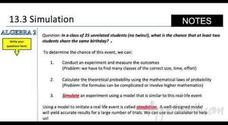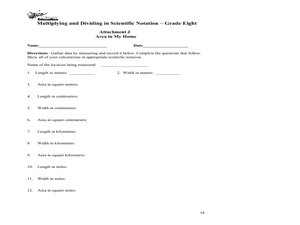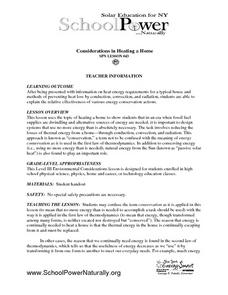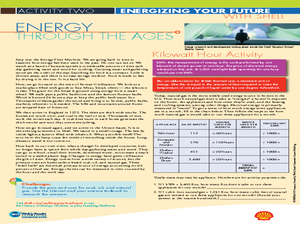Curated OER
Determining the Point of Intersection Using the TI-83 Plus Calculator
Middle and high schoolers graph two lines and identify the point of intersection of each set of line. They use the TI calculator to help them graph and solve. There are six questions with detailed instruction on how to graph correctly.
Curated OER
Calculating Perimeter 2
In this calculating perimeter worksheet, students examine 8 rectangles and use the information provided to find the perimeter of each of them.
Curated OER
Shopping for Candy
Students explore counting money. In this money counting and gingerbread house construction lesson, students use a calculator to determine how much and what type of candy they can buy given 25 cents. Students construct gingerbread houses...
Curated OER
Calculator Code Words 2
In this calculator code words worksheet, students practice solving twenty equations utilizing a calculator. Students then turn the calculator upside down and match the word they see with one of the clues given to each of them.
Curated OER
Calculating the Cost of Living
Bring Consumer Mathematics and Economics to life with this lesson, where learners investigate personal finance and budgeting. They use the newspaper’s classified section to determine a future job and potential earnings and determine a...
Illustrative Mathematics
Checking a calculation of a decimal exponent
In a writing prompt, learners are asked to check the calculation of a decimal exponent without a calculator. Use as an opener or assessment after studying fractional exponents. Requires a strong understanding of exponents and roots to...
Texas Instruments
Drawing a Line Tangent to a Circle
Explore lines tangent to a circle. In this math lesson, students manipulate circles and lines on a TI calculator. They draw a circle and analyze perpendicular lines intersecting the circle in only one place. This activity works best if...
Curated OER
Calculating Stride Length
How many steps does one take to walk a mile? The number of steps one walks in a mile would definitely depend on the length of his stride. Shorter people may take shorter strides, and taller people may take longer strides. This activity...
Illustrative Mathematics
Calculating the square root of 2
Does a calculator give you the exact value of the square root of 2? Here, learners must decide if 1.414236 is equal to the square root of 2. They must also explain why the square root of 2 could never be equal to a terminating decimal....
Virginia Department of Education
Simplifying Square Roots of Whole Numbers
Simplify your life by using a resource on simplifying square roots. Pupils review square roots and calculate values of given radical expressions using a calculator. The lesson plan concludes by having them consider the results to develop...
Teach Engineering
How Big? Necessary Area and Volume for Shelter
Teams must determine the size of cavern needed to house the citizens of Alabraska to protect them from the asteroid impact. Using scaling properties, teams first determining the number of people that could sleep in a classroom and then...
Flipped Math
Simulations
Simulate an exciting graphing calculator-based lesson. Individuals watch and participate creating simulations using the random number generator in a graphing calculator to answer probability problems. Learners then build simulations to...
CK-12 Foundation
Coefficient of Variation: Diverse Populations
What is the height of school clubs? Learners use sliders to calculate the coefficient of variation for three different school groups. Using the calculations, class members compare the variation in the heights of the groups.
101 Questions
Trashketball
Take a shot using a lesson on volume! Young learners watch a video showing a trashcan filling with paper balls. The task is to calculate the number of paper balls that will fit in the can. Pupils use volume calculations to make a...
Mathed Up!
Volume of Prism
The area is essential to volume. As part of the review for the General Certificate of Secondary Education math assessment, a helpful video covers how to find the volume of several common 3-D figures. Pupils use the general volume formula...
Ohio Department of Education
Multiplying and Dividing in Scientific Notation - Grade 8
Here is really nice set of resources on scientific notation. Eighth and ninth graders explore the concept of multiplying and dividing in scientific notation. In this multiplying and dividing numbers in scientific notation lesson,...
EngageNY
Problem Solving Using Rates, Unit Rates, and Conversions
Find a way to work with rates. The 23rd part in a 29-part series presents work problems for the class to solve given work rates. Pupils compare rates to determine which is faster. Some problems require learners to convert the rates to...
Mathed Up!
Drawing Quadratic Graphs
Curve through the points. The resource, created as a review for the General Certificate of Secondary Education Math test, gives scholars the opportunity to refresh their quadratic graphing skills. Pupils fill out function tables to find...
Curated OER
Considerations in Heating a Home
Emerging engineers discover how important it is to conserve energy as fossil fuel supplies are being diminished. This is accomplished by working through a handout that explains energy requirements for heating a home during the winter....
Curated OER
Energy Through the Ages
In this energy through the ages worksheet, students read about the history of energy use beginning with early civilization and the use of water wheels for the production of energy to hydrocarbon-based coal, oil and natural gas of today....
EngageNY
Incredibly Useful Ratios
Start the exploration of trigonometry off right! Pupils build on their understanding of similarity in this lesson that introduces the three trigonometric ratios. They first learn to identify opposite and adjacent sides before exploring...
EngageNY
Using Trigonometry to Determine Area
What do you do when you don't think you have enough information? You look for another way to do the problem! Pupils combine what they know about finding the area of a triangle and trigonometry to determine triangle area when they don't...
EngageNY
Conditional Relative Frequencies and Association
It is all relative, or is it all conditional? Using an exploration method, the class determines whether there is an association between gender and superpower wish through the use of calculating conditional relative frequencies. The last...
McGraw Hill
Adding and Subtracting Mixed Numbers
Adding and subtracting mixed numbers will be a breeze with this guided instructional activity packet. Learners work through examples outlining each step including rewriting mixed numbers as improper fractions, adding numerators, and...

























